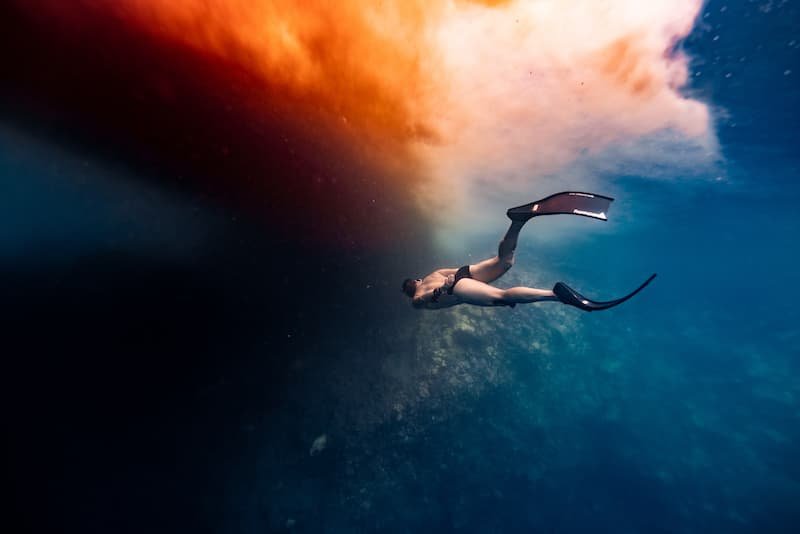
 Olivia Møller
Freediver - Activist - Explorer
Olivia Møller
Freediver - Activist - Explorer

 Olivia Møller
Freediver - Activist - Explorer
Olivia Møller
Freediver - Activist - Explorer
Our oceans, covering more than 70% of the Earth's surface, are home to a diverse array of life, provide sustenance for billions, and play a crucial role in regulating the planet's climate. Yet, the oceans face an ever-increasing threat due to climate change, pollution, overfishing, and habitat destruction. Amidst these challenges, freedivers have emerged as unique advocates for marine conservation. In this article, we'll explore the critical role freedivers play in protecting our oceans, the unique perspective they bring to the cause, and the various ways in which they make a difference.
Freediving, the art of diving on a single breath, has captivated people for centuries. It enables individuals to explore the underwater world in a way that's intimately connected to the ocean's ecosystems. Unlike scuba diving, which relies on tanks of compressed air, freediving embraces a more natural approach, enhancing the connection between humans and the marine environment. One of the key aspects of freediving is its emphasis on mindfulness, breath control, and understanding the delicate balance of nature. These attributes make freedivers uniquely positioned to appreciate the beauty and vulnerability of the oceans.

The oceans, once considered vast and infinitely resilient, now face unprecedented threats driven by human activities. The concept of marine conservation has transformed from a noble endeavor to an absolute necessity. In this section, we'll delve deeper into the conservation imperative and the critical role freedivers play in addressing it.
The Fragility of Ocean Ecosystems: The ecological intricacies of the oceans are awe-inspiring. From the intricate relationships between coral reefs and the species that inhabit them to the migration patterns of marine animals spanning thousands of miles, the oceans are a tapestry of life that we are only beginning to understand. Yet, these ecosystems are incredibly delicate. The smallest perturbation can set off a cascade of negative impacts. Corals, often referred to as the "rainforests of the sea," are particularly susceptible. Rising sea temperatures due to climate change, pollution, and overfishing all stress these ecosystems, leading to coral bleaching and reduced biodiversity. The conservation of these ecosystems is crucial for the health of the planet.
Ocean as the Lungs of the Earth: Beyond their ecological importance, the oceans are a primary source of oxygen production. Phytoplankton, tiny marine organisms, generate a substantial portion of the world's oxygen through photosynthesis. They are also a major carbon sink, absorbing vast amounts of atmospheric carbon dioxide. The role of the oceans in regulating Earth's climate is undeniable. However, this vital service is under threat due to climate change and ocean acidification, making it even more crucial to protect these aquatic environments.
Food Security and Livelihoods: Oceans are a primary source of food for billions of people. Fisheries provide protein and livelihoods to coastal communities worldwide. Overfishing, illegal fishing, and bycatch pose severe threats to marine life and disrupt the balance of marine ecosystems. This not only endangers fish stocks but also the food security and economic well-being of communities that rely on the sea for sustenance.
Plastic Pollution and Toxin Accumulation: Marine pollution, particularly plastic waste, is a growing crisis. The sheer volume of plastic debris in the oceans is staggering. It chokes and entangles marine life, poisons habitats, and disrupts the food chain. Furthermore, plastics break down into microplastics, which can enter the food we consume. Toxins accumulate in marine life, endangering not only the oceans but human health as well. The importance of tackling plastic pollution cannot be overstated.
The Unseen Threat of Climate Change: Climate change is perhaps the most insidious threat to the oceans. Warming temperatures, ocean acidification, and more frequent extreme weather events are causing profound changes in marine ecosystems. Coral reefs, for instance, are especially vulnerable to temperature-induced bleaching events. Rising sea levels threaten coastal communities, and the impacts of climate change are felt across the spectrum of marine life, from phytoplankton to the largest marine mammals.

Freedivers are a unique breed of ocean enthusiasts. They immerse themselves in the depths of the sea, not as passive observers, but as active participants, relying solely on their lung capacity and mental fortitude. This perspective, distinct from traditional scuba divers or snorkelers, provides freedivers with a profound connection to the underwater world and a heightened appreciation of the urgency of marine conservation. Here, we delve into the distinct elements of the freediver's perspective.
Silent Encounters: One of the most striking features of freediving is the silence. Unlike scuba divers, who rely on noisy tanks and regulators, or snorkelers who may disrupt the tranquility with splashing and surface commotion, freedivers glide beneath the surface with little more than the sound of their heartbeat. This silence grants them a unique privilege: the ability to encounter marine life in its most natural state. They observe the undisturbed behavior of creatures great and small, from curious dolphins to elusive seahorses. This silence allows for an intimate connection with the underwater environment, fostering an appreciation for its serenity and the delicate balance that can be disrupted by human activities.
Breath Control and Awareness: Freedivers are masters of breath control and mindfulness. The very essence of their sport hinges on efficient oxygen use and an acute awareness of their own bodies. The ocean depths are not a place for haste; freedivers embrace the ebb and flow of their breath, syncing with the rhythms of the sea. This attunement to breath and body fosters a deep appreciation for the fragile nature of life underwater. It's a reminder that, just as a freediver's breath must be carefully managed to navigate the depths, so too must the oceans' health be carefully preserved.
Personal Connection and Responsibility: Freedivers often describe the ocean as a place where they find solace and transformation. As they descend into the deep blue, they become one with the marine world. The experience is more than mere exploration; it's a spiritual and emotional journey. This sense of personal connection intensifies their commitment to marine conservation. The depths become not just a playground but a responsibility, a place they feel personally obligated to protect.
Witnessing Environmental Change: As frequent visitors to the oceans' depths, freedivers are among the first to witness the changing environment. They have observed the devastating effects of coral bleaching, the dwindling populations of certain species, and the encroachment of human influence into once-pristine waters. These firsthand experiences serve as a poignant reminder that conservation is not an abstract concept but a necessity rooted in the reality of what they've seen and felt beneath the surface.
Beauty and Vulnerability: The beauty of the underwater world is captivating, and freedivers experience it in all its splendor. Yet, they are equally exposed to the vulnerability of these ecosystems. A single thoughtless touch can damage a centuries-old coral, and a discarded piece of plastic can mar a picturesque seascape. This intimate knowledge of the ocean's fragility infuses freedivers with a sense of urgency and responsibility. They not only appreciate the beauty but also recognize the imperative to protect it.

Freedivers, with their unique perspective on the oceans and a deep connection to underwater ecosystems, play a vital and multifaceted role in marine conservation efforts. Here, we explore the diverse ways in which freedivers actively contribute to safeguarding the marine environment:
Underwater Cleanup Efforts: Freedivers are on the front lines of underwater cleanup initiatives. They frequently participate in organized events where they plunge beneath the surface equipped with mesh bags and a deep commitment to removing marine debris. These cleanup efforts target marine litter, particularly plastics, which pose a severe threat to marine life. Freedivers skillfully navigate coral reefs, kelp forests, and other fragile ecosystems, meticulously collecting and removing debris, thereby restoring the natural balance of underwater habitats. The dedication of freedivers to cleaning up our oceans significantly mitigates the harm caused by pollution.
Citizen Science and Data Collection: Freedivers are not just adventurers but also citizen scientists. Their time underwater provides them with invaluable opportunities to gather data on marine life, water quality, and the state of underwater ecosystems. Armed with cameras, they document the health and behavior of marine species and record observations of coral reefs. This data, often contributed to scientific research projects, aids marine biologists and ecologists in their efforts to understand and conserve underwater environments. Freedivers are thus an essential source of information for those studying and striving to protect the oceans.
Raising Awareness Through Art and Media: Many freedivers are talented photographers and videographers, capturing the mesmerizing beauty of the underwater world. Their images and videos serve as compelling tools for raising public awareness about marine conservation issues. They take their audiences on virtual journeys to the depths, portraying the vibrant marine life and showcasing the majesty of the oceans. These visuals evoke a sense of wonder and admiration, compelling viewers to connect with the oceans and acknowledge the urgent need to preserve them. The fusion of art and advocacy allows freedivers to effectively communicate the ocean's plight.
Advocating for Protected Marine Areas: Freedivers are often powerful advocates for the establishment of marine protected areas (MPAs). With their firsthand experiences of the underwater world, they are well-equipped to emphasize the importance of preserving these environments. Freedivers become passionate voices for the conservation of key marine habitats, coral reefs, and sensitive ecosystems. Their advocacy helps in driving policy changes, contributing to the creation and maintenance of MPAs that offer refuge and restoration for marine life.
Supporting Conservation Organizations: Many freediving communities and organizations actively support marine conservation initiatives. They organize fundraising events, participate in awareness campaigns, and partner with established conservation organizations. These collaborative efforts amplify the impact of freedivers, allowing them to channel their passion into concrete actions, such as funding scientific research, conservation projects, and educational programs. This collective dedication strengthens the overall effort to protect the oceans.
Educating the Public: Freedivers often become educators in their own right, sharing their knowledge, experiences, and passion for the oceans with the public. They offer workshops, lectures, and online content that not only showcase the wonders of the underwater world but also convey the urgent need for conservation. Through their engaging storytelling and informative sessions, they inspire others to take action, make more sustainable choices, and become stewards of the oceans themselves. This educational aspect of their contributions is pivotal in building a larger, informed community of ocean advocates.
The contributions of freedivers to marine conservation extend beyond their personal pursuits. They are active participants in safeguarding the oceans they love. Whether through underwater cleanups, data collection, artistic expression, advocacy, fundraising, or education, freedivers are champions of the seas. Their actions resonate with all those who are moved by the oceans' beauty and vulnerability, offering hope in the face of environmental challenges. These individuals demonstrate that even the act of holding one's breath can be a powerful means of making a difference in the preservation of our precious marine ecosystems.

Freediving and marine conservation are intricately intertwined. Freedivers, with their deep connection to the ocean and unique perspective, play a vital role in protecting our seas. Their efforts, whether through underwater cleanups, data collection, advocacy, or education, make a significant difference. By celebrating the union of human and ocean, freedivers offer us a glimpse of the beauty and fragility of the underwater world, inspiring us to protect and preserve it for future generations. Marine conservation is not just the responsibility of governments and scientists; it's a cause that belongs to us all, and freedivers are proving that even the act of holding one's breath can be a powerful way to make a difference.